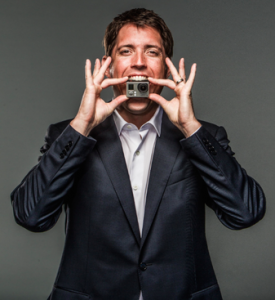 Nicholas Woodman, founder of GoPro, gave birth to his star product while playing and living his passion riding the waves on his surfboard. Play is when great breakthroughs can happen, because you are no longer thinking with your rational mind but rather listening to your inners feelings and instinct.
Nicholas Woodman, founder of GoPro, gave birth to his star product while playing and living his passion riding the waves on his surfboard. Play is when great breakthroughs can happen, because you are no longer thinking with your rational mind but rather listening to your inners feelings and instinct.
The Mad Billionaire Behind GoPro: The World’s Hottest Camera Company
Category Archives: Play
Play Leads to Breakthroughs
 Very often, scientific breakthrough turns out to be an accident. Here is another example of how play and fun mood can lead you to great discoveries.
Very often, scientific breakthrough turns out to be an accident. Here is another example of how play and fun mood can lead you to great discoveries.
In fact breakthroughs must disrupt the logic of what we know; because they bring new knowledge, breakthroughs can come only from parts unknown to the conscious mind and therefore unknown to reason. So breakthrough — even the most intellectual and sophisticated ones – can manifest only at times when we disengage from what we know and from what we understand logically. This is why play is so crucial: it disconnects us from reason and logic and opens us up to new and different thoughts we wouldn’t otherwise have access to.
Why a Relaxed Brain is More Likely to be Creative
 Sleeping relaxes our brain and allows it to make new connections and neural pathways. Creativity happens when those alternative networks process information in new way. The same dynamic is at work when we are playing. Because playing puts aside our rational mind it opens up the door to our deeper creative potential. Play is therefore a factor of creativity and opens us up to the possibility of breakthroughs because it disconnects us from the exclusive and dominant nature of logic, Play is necessary for the survival of an organization because it unleashes and strengthens our problem-solving abilities and resilience as nothing else can.
Sleeping relaxes our brain and allows it to make new connections and neural pathways. Creativity happens when those alternative networks process information in new way. The same dynamic is at work when we are playing. Because playing puts aside our rational mind it opens up the door to our deeper creative potential. Play is therefore a factor of creativity and opens us up to the possibility of breakthroughs because it disconnects us from the exclusive and dominant nature of logic, Play is necessary for the survival of an organization because it unleashes and strengthens our problem-solving abilities and resilience as nothing else can.
Do These 3 Things Before Bed to Hack Your Creativity While You Sleep
What Kind of Intelligence Do You Need to Succeed Today?
In my upcoming book, The Intuitive Compass (Jossey, Bass Oct 2011), I write extensively about the need for business leaders to use what I call Intuitive Intelligence to tap into their ability to effectively manage their employees and generate innovative business strategies and solutions in a complex global marketplace. Before I give you a preview of what Intuitive Intelligence is, it is worthwhile to look at how culture, society, and science have tried to understand and measure intelligence. Read More
A New Corporate Mandate: Rethink Efficiency and Play!
“Play is the highest form of research”
– Albert Einstein
“I was not working, I was playing. I was letting things reassemble in front of my eyes and … I knew I had come up with something that would get me the Nobel Prize… and it did!’
– Dr. Kary Mullis, Scientist, Nobel Prize Winner in Chemistry (1993)
Since 2006 IBM has published a series of biannual studies highlighting the priorities of CEOs around the world. Read More
Michael Schrage and the Intuition Fallacy
“Intuitive Intelligence” on iTunes U: Top Download
The “Intuitive Intelligence” conference I put together for HEC MBA – first business school in Europe per FT ranking over the past 5 years – has become one of the top global downloads for iTunes U.
Intuitive Decision-Making: How Google Bought YouTube
How does an analytic company like Google make its
most important
decisions?
If we are to believe the Google myth, we learn,
first and foremost,
that they test everything:
We test everything at Google. While Read More
Case Study: Creativity versus Results at L’Oréal

According to a recent report in the Wall Street Journal, L’Oréal SA, the world’s largest cosmetics maker, reported flat sales
for the first quarter of 2009 as consumers shied away from its luxury
skin creams and shampoos in favor of its cheaper brands. The maker of products ranging from Giorgio Armani perfume to Lancôme
skin cream and Maybelline eye shadows said sales increased 0.3% to
€4.37 billion ($5.83 billion) in the first three months of 2009.
Jean-Paul Agon, L’Oréal’s chief executive, said that he would not offer
specific guidance for the year but that results would “improve” during
2009.
After accounting for the effect of currency fluctuations, sales fell
9.3% in Western Europe and 5% in North America. This shortfall was
partly offset by an increase in revenue in Asia.
Sales at L’Oréal’s luxury cosmetics division fell, while sales of its consumer drugstore lines increased slightly.
This is an unfortunate turn for L’Oréal which has always been known for its commitment to scientific research and exceptional financial results.
In fact, you might say there is an unresolved tension in its culture between creativity and business results. This tension is visible even on its website. If you read about the “profiles they are looking for” under the marketing category, here’s a description you’ll find:
Creativity, imagination, openness to new ideas – coupled with the highest professionalism.
• Project-oriented, natural team player, at ease working with others in an environment of entrepreneurial challenge.
• Global-minded, flexible, able to juggle multiple priorities.
• Strong analytical thinker, excellent communicator.
You have a keen eye on the latest fashions, a finger on the pulse of emerging consumer and cultural trends. Highly developed interpersonal skills, a passion for results. The personality to make a difference.
Diagnosis: L’Oréal – When East dominates West…
The challenge: help marketers and managers develop a sensitivity to the creative nature of the beauty
product development process and specifically gain an understanding
for the process of research and development.
When the cosmetic group decided to develop a world wide talent appraisal process Sir Lindsay Owen Jones articulated the need to develop a competence key to the success of the group in the eye of the CEO, and that is: sensitivity to métier. What Sir Lindsay Owen Jones was aiming for was to develop a global, shared understanding for beauty products development, for L’Oréal customers, and for a number of other confidential important characteristics identified by the CEO as key factors for success in the beauty industry.
The Human Company was commissioned to research how to define this specific aptitude and how to develop it and train for it. We developed an international training track that is seen today as one of the most successful and inspiring training program available at L’Oréal.
Our approach consists in helping marketers understand how to engage and inspire creative people to contribute the best of their creativity. We used the The Intuitive Compass™ to highlight the tension between results-driven managers and creative teams.

Our analysis: L’Oréal has a product innovation driven business model whereas most of its competitors have often a market-driven model. The company believes in scientific innovation to promote growth. Its founder was a scientist. It is how L’Oréal sustained 20 years of double-digit growth and became the world leader in cosmetics. There is, as I mentioned earlier, a tension in its culture between creativity and business results.
Results: We helped L’Oréal’s teams understand the perspective of the different teams. The creative teams learned about the business aspects they had neglected, while the managers and marketers were helped to understand the creative process. The bridge is intuitive intelligence. Our training program is seen today as one of the most successful and inspiring training program available at L’Oréal. (Average rating: 19.5/20) because it is very relevant with the innovation imperative prevailing in the beauty Industry, articulated by the CEO Jean Paul Agon in his mandate.
FIT: New Intelligence for the New Economy
I just got back from delivering the keynote at the Fashion Institute of Technology‘s 2009 Capstone Presentations and Graduation Reception.
Over the past few weeks, I’ve seen how teams of students have used the ideas we discussed, both on creativity and applied intuitive intelligence, to learn more about the possibilities for exploring new avenues for growth. They are full of enthusiasm and passion for their work – and that is what true education is about. May they keep the fire with them always!


Thanks to everyone for such a wonderful evening: FIT’s Dr. Joyce Brown and Professor Stephan Kanlian, our gracious hosts; my industry colleagues: Karen Grant, Marc Gobe, Candace Corlett, and Mark Pritchard; and of course, Ellen Byron from the Wall Street Journal.
And most importantly, thank you to the students. Yours is the task of building a tomorrow that keeps us alive, hopeful, and yes, sometimes, truly joyful!
My keynote presentation is available here >>
